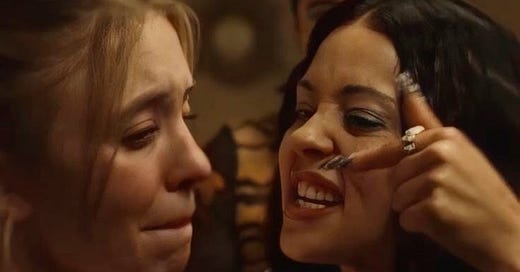Running to Red will always be a free publication, but if you’d like to support me and my work, please consider a paid subscription. 🍒
Time stops when you’ve been betrayed.
The hurt, confusion, and anger don’t just sit quietly; they bloom from your chest and spill out through your eyes. Tears become the only language your body can speak. And even when the moment passes, your brain won’t let you forget. It screams: Be vigilant! Stay focused! This cannot happen again!
Senior year of high school is supposed to be the fun one. The low-stakes, high-reward chapter before the real world begins. For me, it was supposed to be filled with laughter, late-night rehearsals, and memories made with my tight-knit group of theater friends. I was co-leader of our student-run theater group (yes, this is theater kid drama, sorry).
My co-leader was chronically ill, which meant that while we made decisions together, I often had to carry out the hard parts alone when he had a flare-up. It wasn’t his fault, but it created a dynamic where I became the “bad cop.” I was the one who enforced the rules, made the tough calls, and unintentionally alienated myself from the rest of our cast and crew.
But we were friends. At least, I thought we were. We had a group chat. We hung out outside of school. We were a little crew of weirdos, and I loved them. I imagined us staying close for years, visiting each other in artsy cities, going to shows, dancing in clubs, maybe even standing beside each other at weddings.
That’s the thing about teenage friendships: they feel eternal. They’re forged in the fires of shared lockers, inside jokes, and cafeteria confessions. But they’re also fragile, held together by the illusion that everyone is growing in the same direction.
Then it all fell apart.
Rehearsals were breaking down. Tension was high. So, my co-leader and I decided to call a meeting with the cast to clear the air. One friend—someone I’d known since elementary school—volunteered to speak first.
“Well, I think the real issue is that no one likes you, Allie.”
Pow.
“You’re actually really annoying.”
Boom.
“I have a whole folder on my phone of your tweets that I go and laugh at to remind myself how unfunny and pathetic you are.”
Bam.
I cried. I went home and cried more. I left the group chats. Deleted the pictures. And then I had to go back to school the next day and see them. Direct them. Pretend we could all just move on.
The play ran for two nights. It closed on my 18th birthday. I showed up to the cast party, handed over the director’s baton, and called a ride. I haven’t spoken to any of them since. One of them is now a New York influencer. The rest have vanished from my social feed—and from my life.
So why write this?
To trauma dump? Maybe. I was traumatized. That’s not up for debate. Call it pathetic if you want, but that moment ended my teenagerhood. Everything I had built—my confidence, my sense of self, my belief in friendship—was erased in an instant. Like a Thanos snap, pieces of me disappeared.
This is what coming of age sometimes looks like: not a slow, graceful transition, but a sudden, brutal rupture. One moment you’re a kid with a cast of best friends and dreams of the future. The next, you’re standing alone in the wings, realizing the show has gone on without you.
And yet, I’m still here. Writing this. Reclaiming the narrative. Because even if those friendships didn’t last, the lessons did. I learned that not everyone who claps for you wants you to succeed. That leadership can be lonely. That growing up sometimes means letting go.
But I also learned that I’m stronger than I thought. And maybe that’s the real coming of age story.






That wasn’t ‘just’ theater kid drama. That was cruelty masquerading as honesty. And you didn’t deserve it.
loved how honest this was ❤️ I’m glad you’re on here!!